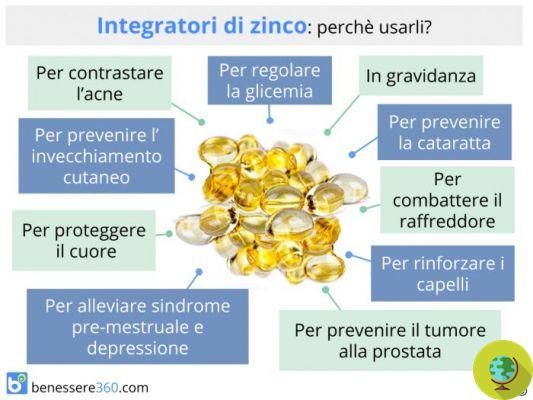
Zinc, a mineral useful for many functions of our body. A deficiency can lead to several symptoms ...
Don't store avocado like this: it's dangerous
Lo zinc it's a essential mineral to different functions of our body including the immune function, the correct and fast healing of wounds, the health of the skin and genital organs. It also regulates the action of hormones such as growth hormones, is useful in protein synthesis, fights free radicals and is involved in the formation of insulin. But how to notice a possible deficiency?
It is not simple, because many typical symptoms of zinc deficiency can be confused with other problems. In general, however, the most frequent symptoms are:
Weakened immune system: therefore we get sick more frequently especially with colds and flu but we are more often subject to other types of infections.
Wounds slow to heal: in case of zinc deficiency, recovery after an injury, such as a cut, occurs more slowly.
Delay in growth (especially in children): precisely because it regulates the functionality of the growth hormone, taking a correct amount of zinc is very important especially in children who otherwise may suffer from slowed growth.
other symptoms that can be linked to a zinc deficiency are:
- fatigue,
- poor appetite,
- sleep problems,
- skin problems such as eczema and acne,
- white spots on the nails,
- poor memory,
- decreased taste sensitivity,
- menstrual problems in the case of women
- low sperm count, low testosterone levels or impotence in men.
An easy way to get the right amount of zinc each day is to consume foods that contain it, among the foods richest in this mineral are the oysters and fish like herring and sardines. It is present in the flesh but can also be found in foods of plant origin such as whole grains, legumes, nuts and seeds although the absorption of zinc from plant foods can be counteracted by the presence of phytates (in cereals and legumes) and oxalates (vegetables and cereals).
Sometimes it can be helpful to take a zinc supplement, especially in times of increased need for this mineral such as pregnancy. It is often found in specific supplements designed specifically for pregnant women.
Read also:
- Arthrosis and zinc: correlation discovered
- 10 supplements food you may need


























